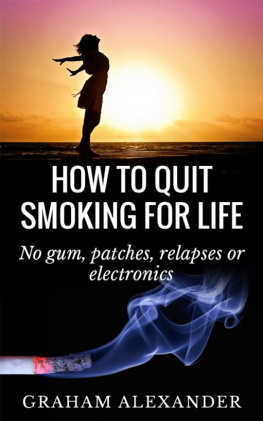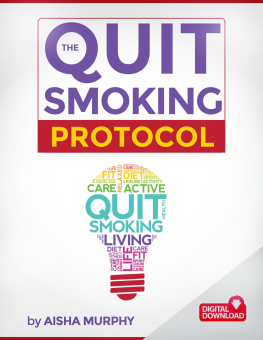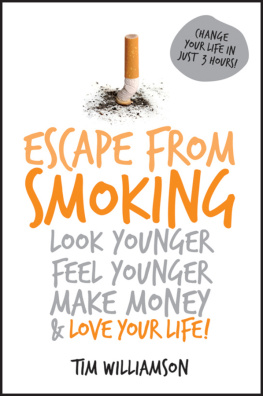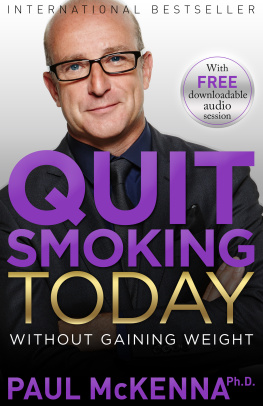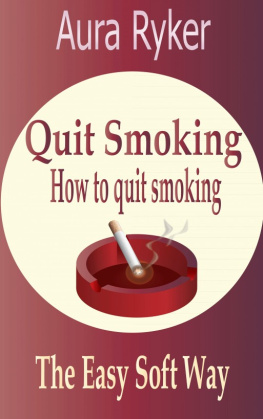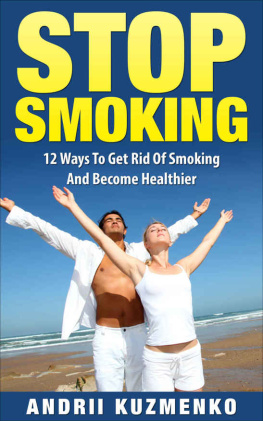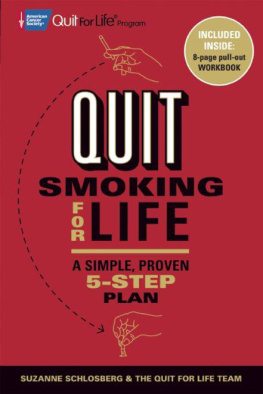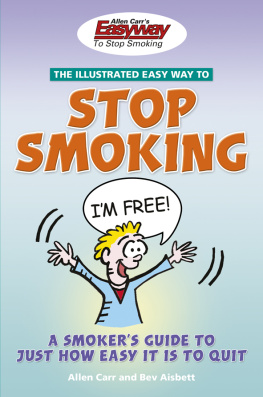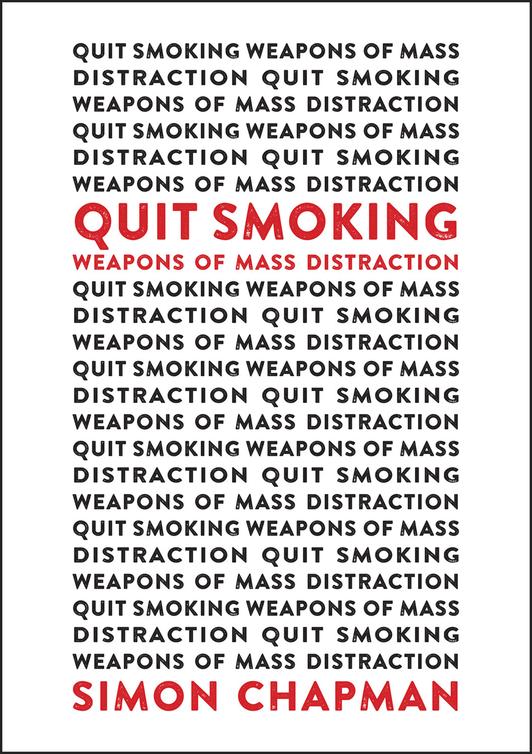
In his always engaging and vivid style of prose, Simon Chapman provides a comprehensive exploration of the critical, yet often unsexy topic of quitting smoking. He brings his vast and varied academic expertise and real-world experiences, accumulated over his illustrious career, to this nuanced examination of how the greatest numbers of people truly quit smoking. This has clear implications for how to most rapidly and effectively bring an end to the massive, yet wholly preventable, tobacco-caused death and disease that the human race continues to endure.
Joanna Cohen, Bloomberg Professor of Disease Prevention, Johns Hopkins University Bloomberg School of Public Health
This is a splendid read for anyone interested in what really works to reduce smoking, and what helps to keep Big Tobacco in business. In Simon Chapmans typically trenchant style, it tells you everything you want to know (and some people wont want to know) about the myths and realities of smoking cessation and other aspects of tobacco policy. All this alongside lessons learned from a lifetimes work on tobacco. Top class dont miss it.
Mike Daube AO, Emeritus Professor in Public Health, Curtin University
Simon Chapmans latest book offers academic and non-academic readers a deep, provocative, historical, current and evidence-based perspective on elements influencing both smoking and the policies which drive it down. This stunning book should promote understanding of the complex relationships between tobacco and pharmaceutical companies, public health practitioners and public policy makers, and smokers who want and must decide how to quit.
Esteve Fernndez, Professor of Public Health, University of Barcelona, and Director of the WHO Collaborating Centre for Tobacco Control, Catalan Institute of Oncology
While the broad evidence that people change from problem drug or alcohol use mostly on their own is still met with scepticism, everybody knows ex-smokers from daily life experience who quit without professional help. Yet, the success stories of this majority of successful quitters and their lay strategies, which could motivate others and inspire population-level measures, are hardly part of the public discourse dominated by the disease concept. Simon Chapman addresses this blind spot and dissects convincingly the agenda of tobacco and treatment industries with their focus on discrediting self-change friendly policies regardless of empirical evidence. The book is an excellent manual to assist necessary changes of perspective and thinking out of the box. To be read before the patient information leaflet!
Dr Harald Klingemann, Senior Research Fellow, Bern University of Applied Sciences
Im here to help you. Who could argue with that? But when people build a business model based on helping individuals, there is little incentive to get rid of the problem. Recent decades have seen the growth of a smoking cessation industry, dedicated to helping individuals quit. With the advent of e-cigarettes, this now includes tobacco producers themselves. Yet as Simon Chapman shows in his fascinating forensic analysis, a narrative has taken hold in tobacco control that is unsupported by evidence, and worse, is a distraction from tackling the real issue. This book will be essential reading, not just for the tobacco control community, but for anyone tackling trade in harmful commodities.
Martin McKee CBE, Professor of European Public Health, London School of Hygiene and Tropical Medicine, Research Director European Observatory on Health Systems and Policies
The tobacco pandemic has resulted from a ludicrous exceptionalist status for tobacco products that governments have wholly failed to address, while devoting endless resources to elaborate, well-intentioned efforts to convince, one by one, people who smoke that they must not try it alone and need help to quit. Simon Chapmans witty and well-argued book suggests cessation programs have perhaps made it even more difficult to become tobacco-free, while distracting from the real issue of better implementing what works to achieve further population-level reductions in tobacco use. There is something in this book for everyone who thinks critically about how to bring the tobacco pandemic to an end.
Ruth Malone, Professor in Social Behavioral Sciences, University of California San Francisco. Editor Tobacco Control since 2009
Simon Chapman has had a distinguished career in public health science, where he has been a strong advocate for both upstream policy and personal agency in behavior change at the population level. This book documents his two-decade struggle against those who argue that quitting smoking is so difficult that the only way that many smokers can quit is by switching to another source of nicotine a business-friendly approach to cessation services. He documents how these advocates have consistently ignored the two-thirds of quitters who continue to achieve nicotine abstinence on their own. This book is a must read for those interested in the politicization of science.
John Pierce, Distinguished Professor Emeritus, University of California San Diego
Simon Chapman is a giant in tobacco control. Fiercely empirical, he shows that Big Pharma has brainwashed too many of us into thinking that drugs are the only way to get off nicotine. Chapman is indispensable reading for anyone wanting to help the billion-odd smokers end their addiction. A powerful and important book!
Robert Proctor Professor of the History of Science at Stanford University. Author of Golden Holocaust: origins of the cigarette catastrophe and the case for abolition. Berkeley: University of California Press, 2011
Quit Smoking Weapons of Mass Distraction
PUBLIC AND SOCIAL POLICY SERIES
Gaby Ramia, Series Editor
The Public and Social Policy series publishes books that pose challenging questions about policy from national, comparative and international perspectives. The series explores policy design, implementation and evaluation; the politics of policy making; and analyses of particular areas of public and social policy.
Australian social attitudes IV: the age of insecurity
Ed. Shaun Wilson and Markus Hadler
Buying and selling the poor: inside Australias privatised welfare-to-work market
Siobhan OSullivan, Michael McGann and Mark Considine
Globalisation, the state and regional Australia
Amanda Walsh
Markets, rights and power in Australian social policy
Ed. Gabrielle Meagher and Susan Goodwin
One planet, one health
Ed. Merrilyn Walton
Risking together: how finance is dominating everyday life in Australia
Dick Bryan and Mike Rafferty
Wind turbine syndrome: a communicated disease
Simon Chapman and Fiona Crichton
Contents
Acknowledgements
It is over 45 years since I first became engaged with questions about how best to reduce tobacco use across populations and the diseases that this causes. Across this time I have met, often worked with and become close friends with many of the best minds in international tobacco control. Seventeen years of that time were spent being deputy editor (199297) and then editor (19982008) of Tobacco Control, the worlds first research journal entirely dedicated to reducing tobacco use and the diseases it causes. During those years, it was a rare day when I was not reading and editing one or more of the thousands of papers that were submitted to the journal, even on Christmas Day. There are very few long-term researchers active across the many disciplinary and sub-topic fields of tobacco control whose most important work Ive not read.



